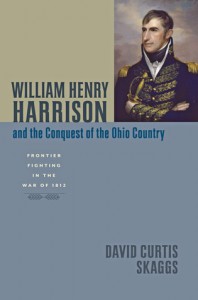William Henry Harrison and his place in American history

William Henry Harrison is unusual among American presidents in that his career before becoming president was far more important to history than his presidency. While the abbreviated tenure in the office (a mere 31 days) was undoubtedly a factor in this, it would have been difficult for him to have improved on his pre-presidential achievements even if he had served a full term in the White House. For as David Curtis Skaggs demonstrates in his study of Harrison's military career, it is thanks to him that the United States did not lose the territory of the upper Midwest to after the War of 1812.
As Skaggs reveals, this was merely the culmination of a distinguished period under arms. The third son of a Tidewater aristocrat, Harrison deferred to his father's wishes and initially pursued a medical career. The elder Harrison's death freed William to abandon his studies and join the United States Army. After a period of service on the frontier under the command of General Anthony Wayne, Harrison transitioned into politics, serving as the governor of Indiana Territory for over a decade. In this position he was at the forefront of the government's efforts to deal with the Native Americans, with Harrison's victory over the confederation at the battle of Tippecanoe breaking the back of independent native resistance to American settlement.
Yet it was Harrison's victory over British forces in the War of 1812 that would prove more important. Early successes by British troops gave them dominance over much of the Great Lakes region, jeopardizing American claims to the territory. Though the British aspired to create a Native American "buffer state" in the region between the United States and Canada, successive American victories culminating in the defeat of retreating British soldiers and their Native American allies at the battle of the Thames effectively ended such plans. Here Skaggs emphasizes the importance of the partnership between Harrison and Oliver Hazard Perry, which he argues was an unusual example of Army-Navy cooperation and a critical factor in the success of American arms in the region.
Extensively researched and convincingly argued, Skaggs's book is an excellent study of Harrison's often underappreciated military career. It benefits greatly from the expansiveness of Skaggs's analysis, which highlights the scope of Harrison's achievements by setting them within the context of the era. By explaining such matters as the debates over Indian policy, the politics of command, and the logistical challenges of frontier warfare, he emphasizes the many challenges Harrison overcame in achieving his successes. Anyone seeking to better understand Harrison and his role in the War of 1812 would do well to start with this book, which gives the general his due as a successful commander and a pivotal figure in American history.






